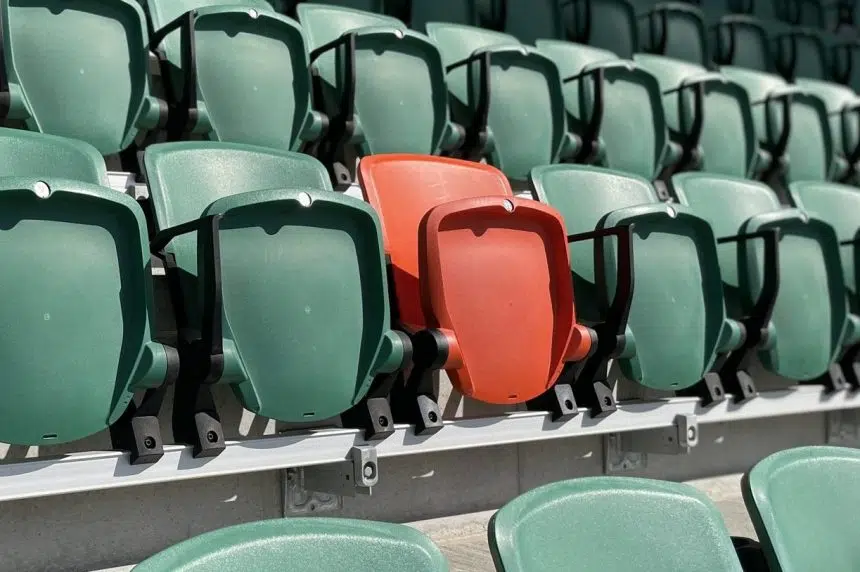Sitting alone in a sea of green at Mosaic Stadium is one orange seat.
On Thursday during Miyo-wîcîwitowin Day, organizers unveiled what’s being called the “Seat of Truth” — Seat 11 in Row 7 of Section 531 in the stadium’s northeast.
“This orange seat will be a permanent, visual reminder of the truth that must be told so that actions of reconciliation can advance,” Regina Mayor Sandra Masters said as she made the announcement. “It’s about the truth …
“When we’re at the stadium, whether it’s (for) a Rider game or a concert, when we look at this seat, we’ll be reminded that the truth must be understood and reconciliation is our focus on behalf of all residential school survivors and their families.”
Thousands were on hand at the stadium for the inaugural Miyo-wîcîwitowin Day, which was held to celebrate and recognize the harm done to Indigenous people through residential schools and colonialism.
“Our Seat of Truth will always remain unseated and unsold,” Masters said. “It will remain available for the spirit of those who do not get the opportunity to witness our world today.
“The seat is a reminder of our shared call to action in the spirit of making concrete changes within our community.”
During a media conference after the announcement, Masters said the seat was the brainchild of the event’s co-chairs, Cowessess First Nation Chief Cadmus Delorme and Regina Exhibition Association Limited (REAL) president-CEO Tim Reid.
Mosaic Stadium sits on the REAL campus.
Masters said the stadium’s main tenants, the CFL’s Saskatchewan Roughriders, were approached about the idea and were fully on board. The organizing committee also sought input from Indigenous groups and Elders, who also approved of the message created by the chair.
The mayor said that message will be broadcast and shared on social media and city websites to explain the seat’s significance.
“The idea (is) that if you look at it, you can’t unsee it,” Masters said. “Every time that Jumbotron is looked at and every time that screen is looked at — and it’s looked at often — you’ll see the orange chair, and it’s meant to remind us that we can’t forget.”
Masters was joined at the event by the mayors of other communities, including Estevan, Lloydminster, Prince Albert, Swift Current and Weyburn. She said she believes the success of Miyo-wîcîwitowin Day in Regina could lead to similar events in other communities.
“One of the elements of today is both that gathering of youth and that focus on youth, but also then that ability to network,” she said. “Everyone in the province, in my experience, is hungry for building connections and relationships because that is actually how you end up learning and understanding.
“Reading is one part and it’s really important. Understanding history is pretty important, but when you can build relationships within communities and extend that olive branch, that’s actually where the real learning and the real teaching happens.”
— With files from 980 CJME’s Lisa Schick







